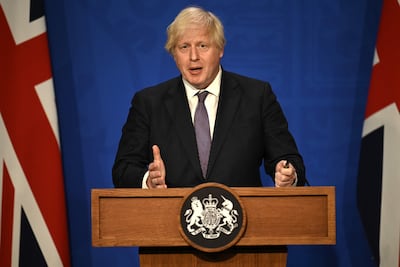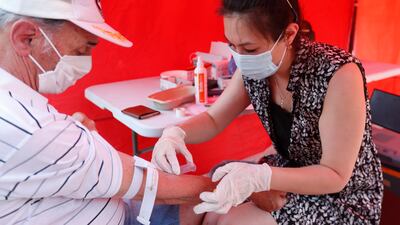The UK will start screening Covid-19 patients for antibodies to determine to what extent recovering from the disease can protect a person against future illness.
Up to 8,000 people a day who test positive for Covid-19 will take a blood test to check for the presence of antibodies.
This will check for a previous immune response caused by vaccination or an earlier infection.
The results will show how common it is for people to catch the virus despite being inoculated or previously recovering from the virus.
Four weeks later, they will be screened again to determine whether fighting off the virus has boosted their immunity levels.
Health chiefs say the project will offer useful data on breakthrough infections and how antibodies respond to different Covid-19 variants.
The UK is relying on high levels of protection from vaccination to avoid further restrictions after lifting most curbs on everyday life last month.
The finger-prick antibody tests have not previously been offered to the UK public.
The first sample must be taken as soon as possible after a Covid-19 infection is confirmed so a quick immune response does not muddy the results.
“Our new national antibody testing will be quick and easy to take part in,” UK Health Secretary Sajid Javid said.
“By doing so you’ll be helping strengthen our understanding of Covid-19 as we cautiously return to a more normal life.”

A separate study suggested that 94 per cent of adults in England had some form of antibody protection, either from vaccines or prior infection.
The estimates were similar in Scotland, Wales and Northern Ireland, which are also taking part in the antibody study.
Scientists have not yet fully established how long antibodies remain in the blood and how much they protect people against different variants.
The strength of a patient’s immune response is also influenced by other factors, including their age and underlying health conditions.
Recovery from Covid-19 in the past six months is treated as equal to vaccination by the National Health Service health pass.
Vaccination has been shown to greatly reduce the risk of developing severe symptoms from Covid-19, but inoculated people can still catch the virus.
Because antibodies take time to develop, the NHS pass does not become available until two weeks after a patient receives their second vaccine dose.
Government figures show that 88 per cent of people over the age of 16 have received at least one dose of a vaccine, with 76 per cent fully vaccinated.
Dr Jenny Harries, head of the UK’s National Health Security Agency, said vaccination offered the best protection against the virus.
“I encourage anyone who has not yet come forward to book their first and second jabs,” she said.


